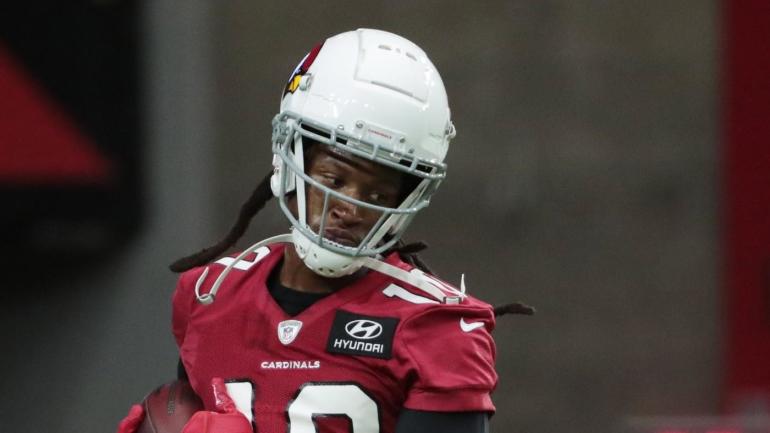
DeAndre Hopkins shocked the NFL community Tuesday when news broke about the contract he negotiated without an agent. The perennial All-Pro wide receiver parted ways with his agent, Todd France, in June. Instead, Hopkins, who was dealt from the Texans in March, utilized a small team of trusted advisors to assist him in his contract discussions with the Cardinals.
The deal is better than anyone ever could have imagined. Hopkins signed a two-year, $54.5 million contract extension averaging $27.25 million per year. $42.75 million of Hopkins' contract is fully guaranteed, which includes a $27.5 million signing bonus. Hopkins got a no-trade clause, the final year of the contract can void based on his performance and the Cardinals can't designate him as franchise or transition player when the deal expires.
Some are mischaracterizing the deal as five years worth $94.415 million averaging $18.883 million per year since Hopkins had three years remaining on his contract for $39.915 million. That isn't how contract negotiations work in the NFL. Every deal I did in my numerous years as an agent was over how much new money and how many new contract years when a player had contract years remaining. Negotiations weren't as if deals were being ripped up like a player wasn't already under contract.
Former longtime Eagles president and Browns CEO Joe Banner concurred. His early mastery of the salary cap and philosophy of re-signing core players well in advance of their contracts expiring was instrumental in Philadelphia making four consecutive NFC Championship Game appearances in the early 2000s.
All contracts are valued by averaging the New Years. If a team doesn’t do that they are actually being penalized for signing a player early, which makes no sense. Never had an agent even push back on this. It’s obviously the fair way to do it.
— Joe Banner (@JoeBanner13) September 8, 2020
The Numbers
Hopkins was scheduled to make $12.5 million this year, $13.5 million in 2021 and $13.915 million in 2022 before his extension. None of Hopkins' money was guaranteed.
Hopkins is getting is a $16.5 million raise this year. His 2020 compensation consists of a $27.5 million signing bonus and a fully guaranteed $1.5 million base salary. The Cardinals gain $5.5 million of salary cap room in the process as Hopkins' 2020 cap number goes from $12.5 million to $7 million.
There's a $9 million option bonus in 2021 to pick up Hopkins' 2024 contract year with a $14.915 million base salary. The option for 2024 must be exercised during the first 10 days of the 2021 league year. The $9 million payment must still be made if the Cardinals decline to pick up the option. In both cases, Hopkins has a fully guaranteed $4.75 million 2021 base salary. Since option bonuses are prorated in the same manner as signing bonuses and it's an absolute certainty the 2024 contract year will be picked up, the Cardinals will get $1 million in 2021 cap relief from Hopkins' extension. His new 2021 cap number is $12.5 million.
Hopkins' $6.65 million 2022 base salary, which is guaranteed for injury at signing, becomes fully guaranteed next March on the fifth day of the 2021 league year. He also has a $10.65 million fifth day of the league year roster bonus in 2022. Hopkins' 2023 base salary is $19.45 million. The cap numbers for 2022, 2023 and 2024 are $25.05 million, $27.2 million and $22.665 million respectively.
The Voidable Provision
Hopkins can void the 2024 contract year based on his performance during the 2020 through 2023 seasons. There are four different ways for Hopkins to get out of the final year. Hopkins can have his freedom by catching at least 400 passes, reaching 5,000 receiving yards, having 40 or more receiving touchdowns, or being named first team All-Pro/All-NFL four times. Accomplishing any of these four things will suffice.
Hopkins has a pretty good chance of voiding the 2024 contract if he continues producing as he has so far during his career. He had exactly 400 catches during the 2015 through 2018 seasons. Hopkins had 5,425 receiving yards during this span. He has also hit 5,000 yards during the four-year period of 2014 through 2017 (5,063) and 2016 through 2019 (5,069). The most receiving touchdowns Hopkins has during four straight seasons is 39. This was from 2015 through 2018. He currently has a three-year streak of first team All-Pro/All-NFL honors, which is the longest of his career.
Hopkins eliminating the final year of the contract would make the deal a one-year extension for $39.585 million. At 31, Hopkins would have extreme leverage over the Cardinals for a new contract because of an inability to keep him from hitting free agency thanks to the franchise/transition tag prohibition while likely remaining in the discussion of the NFL's best wide receiver with sustained outstanding performance.
Deciphering The Deal
Hopkins becomes the highest-paid non-quarterback in NFL history at $27.25 million per year. The last wide receiver to become the NFL's highest-paid non-quarterback was Calvin Johnson in 2012 when he signed a seven-year, $113.45 million extension averaging $16,207,143 per year. Johnson replaced Cardinals wide receiver Larry Fitzgerald, who signed a seven-year, $113 million extension shortly after the 2011 lockout ended, as the top paid non-quarterback. Since 2014, a defensive lineman or edge rusher has set the market for non-quarterbacks.
Hopkins raises the bar for the wide receiver market by nearly 24 percent. Julio Jones had been the league's highest-paid wide receiver with the three-year, $66 million extension averaging $22 million per year he received from the Falcons in 2019. He falls short Jones' wide receiver marks of $64 million fully guaranteed at signing and $66 million of overall guarantees.
Hopkins' $27.5 million signing bonus is the biggest ever for a wide receiver and the fifth most for a non-quarterback currently under contract. His $42.75 million fully guaranteed is the second-best in a wide receiver contract. Hopkins has $49.4 million of overall guarantees. It's practically $60.05 million, which equals his cash in the first three years since his 2022 salary guarantees vests in 2021 and it would be too cost-prohibitive from a salary cap standpoint to get rid of Hopkins before his $10.65 million March 2022 roster bonus is due.
Hopkins is also second to Jones' $66 million in three-year cash. His $60.05 million is $50,000 ahead of Cowboys wide receiver Amari Cooper's $60 million. With $60.05 million in cash, Hopkins is getting a $20.135 million raise during the three remaining years of his contract.
It's conceivable that Hopkins could have bettered Jones in most, if not all, of those categories where he lags behind him had he not pushed for a way of exiting the deal early in order to get back to the negotiating table sooner. Hopkins is potentially the second-highest-paid player in the league because of the voiding mechanism. Reducing the deal to a one-year extension worth $39.585 million would put him $585,000 per year ahead of his former Texans quarterback Deshaun Watson, who just signed a four-year, $156 million extension averaging $39 million per year.
Even if Hopkins can't hit the performance thresholds to void, he has an insanely frontloaded extension. He gets just over 72.5 percent of the new money by the end of 2023, the first new contract year. The Cardinals really should have insisted on a more team-friendly cash flow where Hopkins' 2024 compensation was at least $20 million since voiding is a possibility.
Something I pay close attention to is how contracts measure up adjusted for salary cap inflation. Hopkins' $27.25 million per year is the most for a non-quarterback since the 2011 Collective Bargaining Agreement was implemented. Johnson and Fitzgerald's deals equate to $26,635,620 and $26,579,558 per year under the current $198.2 million salary cap.
Hopkins' $27.25 million per year is also the seventh-best when all contracts in the salary cap era are adjusted. He is right behind Hall of Fame wide receiver Randy Moss, whose $9.3 million per year seven-year extension from 2001 translates to $27,346,043 per year in today's salary cap environment.
Final Thoughts
Hopkins has aspirations of becoming a general manager once his playing days are over. He hit a grand slam home run in his first foray into the NFL business world. Some of the concessions he got from the Cardinals, such as the voidable mechanism and the no franchise/transition tag clause are stunning. Hopkins just might be in the running for the NFL Executive of the Year award someday after he embarks on his second career.

















